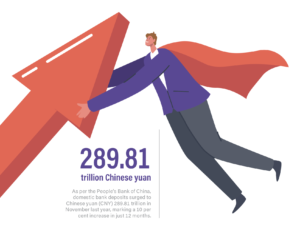
How does China plan to support growth in 2024?
Although China reported its economy grew 5.2 per cent in 2023, meeting the government’s target, it fell well short of widespread expectations of a more robust post-reopening recovery. Tari Such, Jiewei Zhang and Nina Zholudeva of APCO Worldwide analyse how China plans to bolster economic growth in 2024 and the implications for European businesses operating in the country.
In December 2023, senior Chinese officials attended the annual Central Economic Work Conference (CEWC), outlining the government’s economic policy priorities for 2024.[1] Officials appeared confident in the ongoing economic recovery this year, but also cautioned that various internal challenges such as insufficient demand and overcapacity in some industries, coupled with a complex external environment, could impact growth. While striving to tackle these challenges, China’s leaders stressed the need to “manage expectations”, tempering predictions of strong economic growth in 2024.
Considering the higher base in 2023, major international organisations and investment banks predict slower growth in 2024 compared to last year, with average expansion projected at around four and a half per cent.[2],[3],[4]&[5] The official gross domestic product (GDP) target for 2024, set to be announced by Premier Li Qiang at the Two Sessions in March, is likely to align closely with these projections.
Prioritising technological innovation and domestic consumption
Besides the existing challenges, the government’s measured expectations are also due to its ongoing strategy to shift the Chinese economy from relying on industries such as real estate and exports, which are currently struggling, to new growth drivers, including technological innovation and domestic consumption. The inclusion of the phrase “establish first, then break” in this year’s CEWC readout indicates that the government views this transition as a gradual process that will fuel economic growth over time, rather than providing an immediate boost.
Amid escalating technology competition with the United States and European Union (EU), the CEWC for the first time highlighted the promotion of scientific and technological innovation as the top economic priority. This reflects China’s strong desire to maintain its leading position in areas such as new energy vehicles, while striving to catch up in sectors like semiconductors. Consequently, in 2024, the government will continue to use policy tools, such as tax reductions, to support the technology and manufacturing sectors and increase funding for basic research.

Despite the government’s decision to demote its primary concern of boosting domestic consumption to second place in 2024, it remains a significant priority. A key strategy to stimulate consumption this year will be to bolster consumer confidence, which has been low since the COVID-19 lockdowns in 2022. As per the People’s Bank of China, domestic bank deposits surged to Chinese yuan (CNY) 289.81 trillion in November last year, marking a 10 per cent increase in just 12 months.[6] The government’s plan to increase people’s incomes by supporting the private sector and employment could potentially encourage people to start spending.
Making China more attractive for foreign investment
Geopolitical tensions and underwhelming economic performance, combined with heightened security-related scrutiny, have hurt foreign business confidence over the past year. For the first time on record, foreign investment in China turned negative in the third quarter of 2023.[7] The government reiterated its commitment to expand high-level opening-up in the CEWC readout, a sentiment echoed by President Xi Jinping in his 2024 New Year’s speech.[8] Notably, the government pledged to “seriously” address two major concerns of multinational companies operating in China: cross-border data transfer and equal participation in government procurement, while also continuing to ease visa requirements for foreigners.
A significant easing of market access restrictions or a shift away from the current security focus is unlikely. However, the State Council has approved measures to pilot policies in key regions like Beijing, Shanghai and Guangdong, aimed at opening up more sectors to foreign investors, reduce data compliance costs and facilitate talent exchanges.[9]&[10] But the crucial question remains: how will these measures be translated into practical policies that can benefit foreign companies? In this context, European businesses can expect the Chinese government to continue rolling out supportive policies, but they need to closely monitor the implementation process.
Diffusing risks to economic growth
To foster growth, the authorities will also need to mitigate factors that could negatively impact economic progress. The biggest drag on China’s economic growth in 2023 was the continued downturn in the property sector, which represents about a quarter of the economy. To address this issue, the government plans to support the“reasonable financing needs” of both state-owned and private property developers grappling with liquidity issues. On the demand side, the omission of the phrase“housing is for living in, not speculation”in the CEWC readout suggests the removal of restrictions on multiple-home purchases in more cities this year. This support could lead to a stabilisation in real estate sales, likely spearheaded by upper-tier cities.
China’s property downturn has also exacerbated financial risks for local governments, who rely on land sales as a major source of revenue. Declining sales have increased the difficulty of repaying local government debt, with explicit debt reaching CNY 40 trillion in October last year.[11] Implicit local government debt could be even larger. To tackle these risks, the central government is expected to provide further financial support in 2024, following on from the issuance of CNY 1 trillion of sovereign bonds and other measures last year.[12] More stringent oversight of heavily-indebted local governments is also likely.
Balancing economic growth and environmental sustainability
Despite the demands of boosting growth and minimising risks, China’s climate goals will remain high on the agenda in 2024. At the CEWC, leaders called for“an active and prudent approach”to the dual goals of reaching peak CO2 emissions by 2030 and carbon neutrality by 2060. Impressive progress has already been made on this front: some forecasts predict a decline in CO2 emissions this year, thanks in part to a vast expansion in renewable capacity.[13] However, coal will retain a key role in the energy mix, in line with China’s strategy of installing low-carbon infrastructure before phasing out traditional energy. Beyond emissions, the country’s leaders have called for more efficient and circular use of resources, potentially signalling new environmental regulations for businesses.
China’s industrial policy will also have major green components. Accelerating the transformation of traditional industries, listed under the primary task of industrial modernisation at the CEWC, will involve green upgrades. Steel and other industries covered by the EU’s Carbon Border Adjustment Mechanism (CBAM) could be focus areas for such efforts. Beijing’s ambitions for new growth drivers also centre on green and low-carbon technologies, such as electric vehicles and clean energy. However, like the CBAM, these are likely to remain a point of friction between China and the EU as the bloc weighs measures over what it alleges are unfair industrial policies.
Conclusion
Despite facing some serious challenges, China’s economy is projected to grow significantly faster than the global average this year, thereby continuing to offer a wealth of opportunities for European businesses operating in the country. However, the outlook for 2024 also presents a number of uncertainties which businesses will need to navigate, necessitating close monitoring of economic, regulatory, and geopolitical developments.
APCO Worldwide is an advisory and advocacy communications consultancy. We partner with public and private sector organisations to help them catalyse progress, act with agility and build organisational reputations, brands, relationships and solutions to succeed. APCO is an independent and majority women-owned business. In China, our team possesses the local wisdom to advise our clients on issues critical to their success. We provide one-stop solutions that integrate business intelligence, political insight and strategic communications.
[1] China holds Central Economic Work Conference to plan for 2024, Xinhua, 12th December 2023, viewed 12th January 2024, < https://english.news.cn/20231212/32d6c559a458405ba3ed3b42e7bae299/c.html>
[2] People’s Republic of China, International Monetary Fund, viewed 12th January 2024, <https://www.imf.org/en/Countries/CHN>
[3] The World Bank in China, The World Bank, viewed 12th January 2024, <https://www.worldbank.org/en/country/china>
[4] The global economy will perform better than many expect in 2024, Goldman Sachs, 10th November 2023, viewed 12th January 2024, <https://www.goldmansachs.com/intelligence/pages/the-global-economy-will-perform-better-than-many-expect-in-2024.html>
[5] 2024 Global Macroeconomic Outlook: Central Banks Look for ‘Just Right’ on Rates, Morgan Stanley, 22nd November 2023, viewed 12th January 2024, <https://www.morganstanley.com/ideas/global-macro-economy-outlook-2024>
[6] November 2023 financial statistics report, The People’s Bank of China, 13th December 2023, viewed 12th January 2024, <http://www.pbc.gov.cn/diaochatongjisi/116219/116225/5167460/index.html>
[7] China’s first deficit in foreign investment signals West’s ‘de-risking’ pressure, Reuters, 6th November 2023, viewed 12th January 2024, < https://www.reuters.com/world/china/chinas-first-deficit-foreign-investment-signals-wests-de-risking-pressure-2023-11-06/>
[8] Full text of President Xi Jinping’s 2024 New Year message, Xinhua, 31st December 2023, viewed 12th January 2024, < https://english.news.cn/20231231/4e0fc2697d994cd2b4dcb5dca525a611/c.html>
[9] Beijing to further open up service sector, State Council, 23rd December 2023, viewed 12th January 2024, <https://english.www.gov.cn/policies/latestreleases/202311/23/content_WS655f3adbc6d0868f4e8e18b8.html>
[10] China to advance high-level institutional opening-up of Shanghai FTZ, State Council, 7th December 2023, viewed 12th January 2024, <https://english.www.gov.cn/policies/latestreleases/202312/07/content_WS657192c2c6d0868f4e8e1f90.html>
[11] Local government bond issuance and debt balance in November 2023, Ministry of Finance, 25th December 2023, viewed 12th January 2024, <https://yss.mof.gov.cn/zhuantilanmu/dfzgl/sjtj/202312/t20231225_3923816.htm>
[12] Zhang, E, and Yao, K, China to issue $137 bln sovereign debt to support economy, Reuters, 25th October 2023, viewed 12th January 2024, <https://www.reuters.com/markets/rates-bonds/china-issue-137-bln-sovereign-debt-support-economy-2023-10-24/>
[13] Myllyvirta, L, Analysis: China’s emissions set to fall in 2024 after record growth in clean energy, Carbon Brief, 13th November 2023, viewed 12th January 2024, <https://www.carbonbrief.org/analysis-chinas-emissions-set-to-fall-in-2024-after-record-growth-in-clean-energy/>


Recent Comments